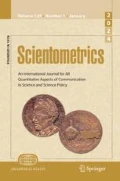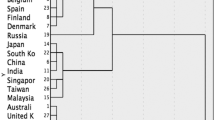Abstract
At a time when the knowledge race is at its most intense, the scientific wealth of nations is increasingly relevant to ensure the preparedness and competitiveness of societies in a globalised, increasingly uncertain and integrated global knowledge economy. Scientific wealth also helps nations become resilient in the face of ever-growing knowledge and technological shifts. Hong Kong and Singapore, which are multicultural, internationalised and capitalist territories, have been part of globalisation since its beginning, and they are renowned for their vibrant research communities. However, given that East Asia and Southeast Asia are becoming worldwide centres of research power and are facing increasing regional competitiveness, a persistent question is whether the two territories are keeping up with the competition and are key players in the global knowledge race. Analysis of their knowledge creation and worldwide impact over the past 20 years indicates that these two territories are struggling to keep up and are showing declining competitiveness. This loss of competitiveness, including in major thematic areas such as Decision Sciences and Business where they had substantial leads in the past, is making these territories indistinguishable from others as knowledge centres, and they are thus potentially less visible and less appealing to potential knowledge related investors. As they continue to be highly internationalised, the main reason behind these trends seems to be related to critical underinvestment in their research systems.







Similar content being viewed by others
Notes
Calculation made by the author based on the Scimago dataset used in the analysis of this article.
See https://www.ugc.edu.hk/doc/eng/ugc/publication/report/report20180606/interim.pdf [accessed on 29th June 2018].
References
Abramo, G., D’Angelo, C. A., & Solazzi, M. (2011). Are researchers that collaborate more at the international level top performers? An investigation on the Italian university system. Journal of Informetrics, 5(1), 204–213.
Adriaanse, L. S., & Rensleigh, C. (2013). Web of Science, Scopus and Google Scholar: A content comprehensiveness comparison. The Electronic Library, 31(6), 727–744.
Archambault, E., Campbell, D., Gingras, Y., & Larivière, V. (2009). Comparing bibliometric statistics obtained from the Web of Science and Scopus. Journal of the Association for Information Science and Technology, 60(7), 1320–1326.
Baccini, A., Barabesi, L., Cioni, M., & Pisani, C. (2014). Crossing the hurdle: The determinants of individual scientific performance. Scientometrics, 101(3), 2035–2062.
Balassa, B. (1965). Trade liberalization and revealed comparative advantage. The Manchester School of Economic and Social Studies, 33, 99–123.
Barrot, J. S. (2017). Research impact and productivity of Southeast Asian countries in language and linguistics. Scientometrics, 110(1), 1–15.
Bishop, K., D’Este, P., & Neely, A. (2011). Gaining from interactions with universities: Multiple methods for nurturing absorptive capacity. Research Policy, 40(1), 30–40.
Cavacini, A. (2016). Recent trends in Middle Eastern scientific production. Scientometrics, 109(1), 423–432.
Choung, J.-Y., & Hwang, H.-R. (2000). National systems of innovation: Institutional linkages and performances in the case of Korea and Taiwan. Scientometrics, 48(3), 413–426.
Cimini, G., Gabrielli, A., & Labini, F. S. (2014) The scientific competitiveness of nations. PLoS ONE, 9(12): article number 0113470.
Costinot, A., Donaldson, D., & Komunjer, L. (2012). What goods do countries trade? A quantitative exploration of Ricardo’s ideas. Review of Economic Studies, 79(2), 581–608.
Deb, K., & Hauk, W. R., Jr. (2017). RCA indices, multinational production and the Ricardian trade model. International Economics and Economic Policy, 14(1), 1–25.
Deem, R., Mok, K.-H., & Lucas, L. (2008). Transforming higher education in whose image? Exploring the concept of world-class university in Europe and Asia. Higher Education Policy, 21(1), 83–97.
Erfanmanesh, M., Jahromi, R. B., Hosseini, E., & Gholamhosseinzadeh, Z. (2013). Scientific productivity, impact and collaboration of the top Asian countries in Scopus during 1996–2010. Collnet Journal of Scientometrics and Information Management, 7(1), 97–110.
Esser, F., & Vliegenthart, R. (2017). Comparative Research Methods. In J. Matthes, R. Potter, & C. S. Davis (Eds.), International encyclopedia of communication research methods (pp. 1–22). London: Wiley-Blackwell.
French, S. (2017). Revealed comparative advantage: What is it good for? Journal of International Economics, 106, 83–103.
Fuchs, M. (2014). Worldwide knowledge? Global firms, local labour and the region. Farnham: Ashgate.
George, A. L., & Bennett, A. (2005). Case studies and theory development in the social sciences. Cambridge: MIT Press.
He, Z.-L., Geng, X.-S., & Campbell-Hunt, C. (2009). Research collaboration and research output: A longitudinal study of 65 biomedical scientists in a New Zealand university. Research Policy, 38(2), 306–317.
Heitor, M., & Bravo, M. (2010). Portugal at the crossroads of change, facing the shock of the new: People, knowledge and ideas fostering the social fabric to facilitate the concentration of knowledge integrated communities. Technological Forecasting and Social Change, 77(2), 218–247.
Heitor, M. V., Horta, H., & Mendonça, J. (2014). Developing human capital and research capacity: Science policies promoting brain gain. Technological Forecasting and Social Change, 82, 6–22.
Horta, H., & Veloso, F. (2007). Opening the box: Comparing EU and US scientific output byscientific field. Technology Forecasting and Social Change, 74(8), 1334–1356.
King, D. A. (2004). The scientific impact of nations: What different countries get for their research spending. Nature, 430, 311–316.
Kratke, S. (2011). The creative capital of cities: Interactive knowledge creation and urbanization economies of innovation. Chichester: Wiley.
Kwan, B. S. (2010). An investigation of instruction in research publishing offered in doctoral programs: The Hong Kong case. Higher Education, 59(1), 55–68.
Kwiek, M. (2015). The internationalization of research in Europe: A quantitative study of 11 national systems from a micro-perspective. Journal of Studies in International Education, 19(4), 341–359.
Lee, J. T. (2015). Soft power and cultural diplomacy: Emerging education hubs in Asia. Comparative Education, 51(3), 353–374.
Lee, S. W., & Ducruet, C. (2009). Spatial glocalization in Asia-Pacific hub port cities: A comparison of Hong Kong and Singapore. Urban Geography, 30(2), 162–184.
Lee, L.-C., Lee, Y.-Y., & Liaw, Y.-C. (2012). Bibliometric analysis for development of research strategies in agricultural technology: The case of Taiwan. Scientometrics, 93(3), 813–830.
Lee, L.-C., Lin, P.-H., Chuang, Y.-W., & Lee, Y.-Y. (2011). Research output and economic productivity: A Granger causality test. Scientometrics, 89, 465–478.
Leydesdorff, L., & Zhou, P. (2005). Are the contributions of China and Korea upsetting the world system of science? Scientometrics, 63(3), 617–630.
Lo, W. Y. W. (2018). After globalization: A reconceptualization of transnational higher education governance in Singapore and Hong Kong. Higher Education Quarterly, 72(1), 3–14.
Lundvall, B. A., Joseph, K. J., Chaminade, C., & Vang, J. (Eds.). (2009). Handbook of innovation systems and developing countries: Building domestic capabilities in a global setting. Cheltenham: Edward Elgar.
May, R. M. (1997). The scientific wealth of nations. Science, 275, 793–796.
Miguel, S., Moya-Anegón, F., & Herrero-Solana, V. (2010). The impact of the socio-economic crisis of 2001 on the scientific system of Argentina from the scientometric perspective. Scientometrics, 85(2), 495–507.
Mongeon, P., & Paul-Hus, A. (2016). The journal coverage of web of science and scopus: A comparative analysis. Scientometrics, 106(1), 213–228.
Okubo, Y. (1997). Bibliometric indicators and analysis of research systems: Methods and examples. OECD Science, Technology and Industry Working Papers, 1997/1, OECD Publishing, Paris.
Park, J. (2017). Higher education knowledge production in postcolonial-neoliberal Asia. In J. Jung, H. Horta, & A. Yonezawa (Eds.), Researching higher education in Asia: History, development and future (pp. 51–72). Singapore: Springer.
Patelli, A., Cimini, G., Pugliese, E., & Gabrielli, A. (2017). The scientific influence of nations on global scientific and technological development. Journal of Informetrics, 11(4), 1229–1237.
Pathak, M., & Bharati, K. A. (2014). Botanical survey of India (1971–2010): A scientometric analysis. Current Science, 106(7), 964–971.
Pereira, T. S. (2002). International dimension of research in Portugal: The European research area and beyond. Science and Public Policy, 29(6), 451–461.
Postiglione, G. A. (2013). Anchoring globalization in Hong Kong’s research universities: Network agents, institutional arrangements, and brain circulation. Studies in Higher Education, 38(3), 345–366.
Radosevic, S., & Yoruk, E. (2014). Are there global shifts in the world science base? Analysing the catching-up and falling behind of world regions. Scientometrics, 101(3), 1897–1924.
Ryan, M. P. (1998). Knowledge diplomacy—Global competition and the politics of intellectual property. Washington DC: Brookings Institution Press.
Shilirò, D. (2010). Investing in knowledge: Knowledge, human capital and institutions for the long run growth. In M. J. Arentsen, W. van Rossum, & A. E. Seenge (Eds.), Governance in innovation: Firms, clusters and institutions in a changing setting (pp. 33–50). Cheltenham: Edward Elgar.
Shin, J. C., & Jung, J. (2014). Academics job satisfaction and job stress across countries in the changing academic environments. Higher Education, 67(5), 603–620.
Sombatsompop, N., Markpin, T., Ratchatahirun, P., Yochai, W., Ittiritmeechai, S., Premkamolnetr, N., et al. (2011). Research productivity and impact of ASEAN countries and universities in the field of energy and fuel. Malaysian Journal of Library & Information Science, 16(1), 35–46.
Wang, L. (2016). The structure and comparative advantages of China’s scientific research: Quantitative and qualitative perspectives. Scientometrics, 106(1), 435–452.
Wang, L., & Wang, X. (2017). Who sets up the bridge? Tracking scientific collaborations between China and the European Union. Research Evaluation, 26(2), 124–131.
Yang, R. (2015). Reassessing China’s higher education development: A focus on academic culture. Asia Pacific Education Review, 16(4), 527–535.
Yang, R. (2017). Foil to the West? Interrogating perspectives for observing East Asian higher education. In J. Jung, H. Horta, & A. Yonezawa (Eds.), Researching higher education in Asia: History, development and future (pp. 37–50). Singapore: Springer.
Yigitcanlar, T., Metaxiotis, K., & Carrillo, F. J. (Eds.). (2012). Building prosperous knowledge cities: Policies, plans and metrics. Cheltenham: Edward Elgar.
Author information
Authors and Affiliations
Corresponding author
Additional information
Research developed while on sabbatical leave at the Center for Global Higher Education, Institute of Education, University College London, UK, and at the Graduate School of Asia Pacific Studies, Waseda University, Japan.
Rights and permissions
About this article
Cite this article
Horta, H. The declining scientific wealth of Hong Kong and Singapore. Scientometrics 117, 427–447 (2018). https://doi.org/10.1007/s11192-018-2845-0
Received:
Published:
Issue Date:
DOI: https://doi.org/10.1007/s11192-018-2845-0




